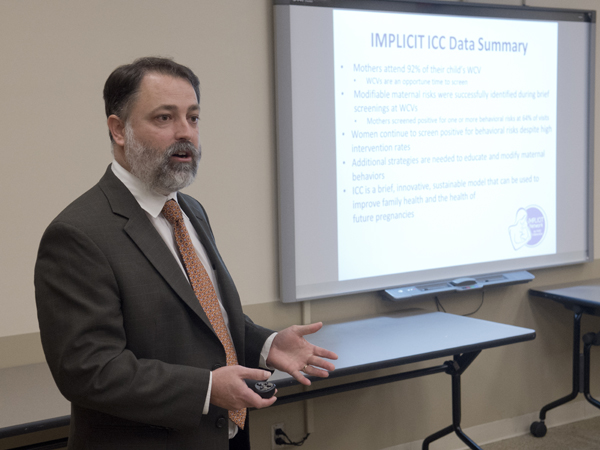IMPLICIT training to boost healthy births by reaching moms before pregnancy

New mothers might skimp on their own doctor visits, but typically they will make sure their babies get to pediatric appointments.
That theory, backed by research, is the basis of IMPLICIT, an acronym for Interventions to Minimize Preterm and Low Birth Weight Infants through Continuous Improvement Techniques.
Started in 2003 as a collaboration of family medical residency programs in the northeastern U.S., IMPLICIT's aim is to reduce the number of preterm births. Since then, more than 500 residents have been trained and more than 13,000 babies have been delivered. The average network preterm birth rate is less than 10 percent.
In Mississippi, about 13 percent of babies are born before the 37th week of pregnancy. Among African-American mothers, that rate is 44 percent higher than the rate among all other women. Nationally, the rate of premature birth is 9.6 percent.

“Mississippi has one of the highest prematurity rates in the country,” said Dr. Nneka Holder, UMMC associate professor of adolescent medicine and physician champion of the IMPLICIT program in Mississippi. “We have to do this. We cannot stay on the trajectory we've been on.”
Dina Ray, executive director of market development for the Jackson Metro Market March of Dimes, said, “We have to ask, 'What can we do to think outside of the box?'”
March of Dimes Mississippi provided funding to bring IMPLICIT to the state. At UMMC, pediatric residents will learn what interventions worked in the Family Medicine Education Consortium's program in Pennsylvania, New York, Connecticut, Maryland, Massachusetts and North Carolina.
One difference between those sites and Mississippi, Ray said, is that mothers in the northeast tend to take their babies to family medicine physicians, while Mississippi mothers visit pediatricians with their children.

“We were asking, 'How can we do this program in Mississippi?'” Ray said. “We wanted to get the pediatrics residents at the University of Mississippi School of Medicine involved.”
Dr. Rick Barr, Suzan B. Thames Professor and Chair of Pediatrics at UMMC, said reaching new mothers through their children's well-baby visits will result in healthier families.
“We want all babies to have the best start possible,” he said, “and that starts with a healthy mother.”
Dr. Michelle Owens, UMMC associate professor of obstetrics and gynecology, said she agrees.
“IMPLICIT, by reaching mothers between pregnancies, can affect mothers' health in a positive way,” Owens said. “Having healthier mothers builds a healthier foundation for families.”
A team of trainers traveled from North Carolina and Pennsylvania to Mississippi for training sessions for pediatric and family medicine residents earlier this month. Key points are ways to ask mothers, when seeing their children, about their own health. Included in screening are questions about whether the mother smokes or has resumed smoking after pregnancy, suffers from depression, uses contraceptives and takes multivitamins.
Based on answers, pediatricians can then refer new mothers to the care that will keep them healthy and prevent future births from being preterm.
Modifiable risk factors for mothers can be identified during well-child visits, said Dr. Daniel Frayne, medical director of Mountain Area Health Education Centers in Asheville, North Carolina, and associate professor of family medicine at the University of North Carolina-Chapel Hill School of Medicine.
“There are about 10 well-child visits in a child's first two years, and 92 percent of the time, mom will be there,” he said.

Frayne said talking with mothers before the conception of another child allows for health interventions to occur before conception, when they can have the greatest impact on future pregnancies.
As part of IMPLICIT, mothers are encouraged to stop smoking and are screened for depression. They are also encouraged to take multivitamins that include folic acid, since only 24 percent of reproductive-age women consume the daily recommended dose. Folic acid and folate have been shown to prevent miscarriage and neural tube birth defects.
Another risk factor in low-weight births is the spacing between births. For this reason, residents are trained to ask mothers about contraception and, if needed, they can provide necessary prescriptions or referrals.
According to Dr. Whitney Herring, assistant professor of pediatrics, IMPLICIT should have a significant impact on the health of families, should prevent preterm births in the future and should promote the well-being of mothers and their babies. She said asking mothers a few short but important questions in a clinical setting can be key to a mother's health after her baby is born and before any future pregnancies.
“We don't know what a mother is receiving in health care unless we ask,” she said.
Dr. Darren Scoggin, a pediatric resident from Ellisville, said the IMPLICIT training “helps promote the health of babies and the health of mothers. It's needed and will help increase the quality of care for families.”


